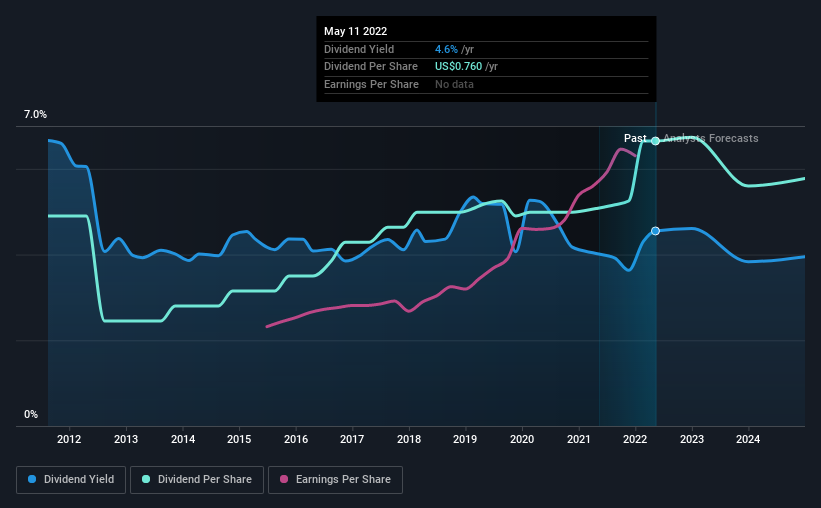
The board of United Bancorp, Inc. (NASDAQ:UBCP) has announced that it will be increasing its dividend on the 17th of June to US$0.15. This will take the annual payment to 4.5% of the stock price, which is above what most companies in the industry pay.
View our latest analysis for United Bancorp
United Bancorp's Payment Has Solid Earnings Coverage
Impressive dividend yields are good, but this doesn't matter much if the payments can't be sustained. Before making this announcement, United Bancorp was easily earning enough to cover the dividend. This means that most of what the business earns is being used to help it grow.
Looking forward, earnings per share is forecast to fall by 3.2% over the next year. Assuming the dividend continues along recent trends, we believe the payout ratio could be 54%, which we are pretty comfortable with and we think is feasible on an earnings basis.

Dividend Volatility
The company's dividend history has been marked by instability, with at least 1 cut in the last 10 years. The first annual payment during the last 10 years was US$0.56 in 2012, and the most recent fiscal year payment was US$0.76. This means that it has been growing its distributions at 3.1% per annum over that time. It's encouraging to see some dividend growth, but the dividend has been cut at least once, and the size of the cut would eliminate most of the growth anyway, which makes this less attractive as an income investment.
The Dividend Looks Likely To Grow
With a relatively unstable dividend, it's even more important to see if earnings per share is growing. We are encouraged to see that United Bancorp has grown earnings per share at 16% per year over the past five years. A low payout ratio and decent growth suggests that the company is reinvesting well, and it also has plenty of room to increase the dividend over time.
United Bancorp Looks Like A Great Dividend Stock
Overall, we think this could be an attractive income stock, and it is only getting better by paying a higher dividend this year. The company is generating plenty of cash, and the earnings also quite easily cover the distributions. However, it is worth noting that the earnings are expected to fall over the next year, which may not change the long term outlook, but could affect the dividend payment in the next 12 months. All in all, this checks a lot of the boxes we look for when choosing an income stock.
Market movements attest to how highly valued a consistent dividend policy is compared to one which is more unpredictable. However, there are other things to consider for investors when analysing stock performance. For example, we've picked out 2 warning signs for United Bancorp that investors should know about before committing capital to this stock. If you are a dividend investor, you might also want to look at our curated list of high yield dividend stocks.
New: AI Stock Screener & Alerts
Our new AI Stock Screener scans the market every day to uncover opportunities.
• Dividend Powerhouses (3%+ Yield)
• Undervalued Small Caps with Insider Buying
• High growth Tech and AI Companies
Or build your own from over 50 metrics.
Have feedback on this article? Concerned about the content? Get in touch with us directly. Alternatively, email editorial-team (at) simplywallst.com.
This article by Simply Wall St is general in nature. We provide commentary based on historical data and analyst forecasts only using an unbiased methodology and our articles are not intended to be financial advice. It does not constitute a recommendation to buy or sell any stock, and does not take account of your objectives, or your financial situation. We aim to bring you long-term focused analysis driven by fundamental data. Note that our analysis may not factor in the latest price-sensitive company announcements or qualitative material. Simply Wall St has no position in any stocks mentioned.
About NasdaqCM:UBCP
United Bancorp
Operates as the bank holding company for Unified Bank that provides commercial and retail banking services in Ohio.
Flawless balance sheet established dividend payer.
Similar Companies
Market Insights
Community Narratives




